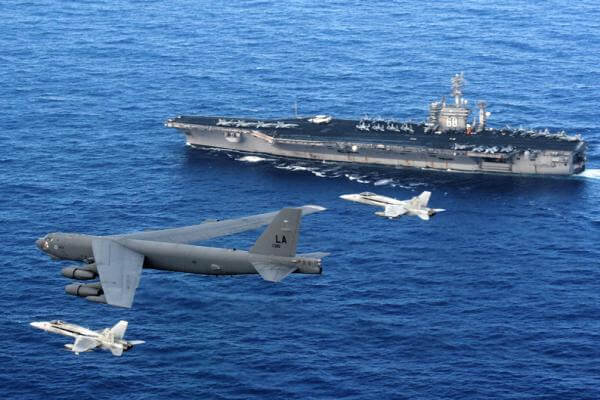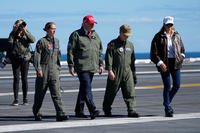China accused the US Saturday of a serious military provocation following the flight of a US Air Force B-52 strategic bomber over China's disputed territory in the South China Sea.
A Chinese Defense Ministry statement said the US is deliberately raising tensions in the disputed region. It demanded Washington immediately take measures to prevent such incidents and damage to relations when the two nations' militaries.
Pentagon officials told The Wall Street Journal they are investigating the flight path of the B-52. The military jet flew closer to Cuarteron Reef in the Spratly Islands. A senior US defense official told the Journal bad weather may have contributed to the pilot flying off course and into area China claims.
In October, a US Navy ship passed within 12 nautical miles of the disputed islands in the South China Sea. Chinese officials warned the guided missile destroyer USS Lassen as it moved inside the zone around the Subi Reef.
Navy officials said at the time that the sail-past was necessary to assert the US position that China's man-made islands cannot be considered sovereign territory with the right to surrounding territorial waters.Two American B-52 bombers also flew near the artificial islands last month.
"We conduct B-52 flights in international air space in that part of the world all the time," Pentagon spokesman Peter Cook said in November. "My understanding is there was one B-52 flight, I'm not even sure the date on it, but there was an effort made by Chinese ground controllers to reach out to that aircraft and that aircraft continued its mission. Nothing changed."
The Pentagon said the recent B-52 flights were unplanned.
"For this mission, there was no intention of flying to within 12 nautical miles, Cmdr. Bill Urban, a Pentagon spokesman, told The Wall Street Journal.
China's Defense Ministry called the flight and other US military operations in the South China Sea "serious military provocations" that could cause militarization in the region.
Washington and Beijing are locked in a diplomatic dispute over the South China Sea, with China declaring territorial sovereignty over the region while the US insists on freedom of navigation.
China "firmly opposes violating international law and undermining China's sovereignty and security interests under the pretext of navigation and overflight freedom," China Foreign Ministry spokesman Hong Lei said last month.
In an effort to consolidate its claim, China has been piling sand on the reefs and atolls in the Spratly Islands archipelago before adding buildings, ports and airstrips big enough to handle bombers and fighter jets. China has also attempted to impose a 12-nautical mile limit around the islands, contrary to international law, which says such limits cannot be set around islands built on previously submerged reefs.
To make matters even more contentious, the US approved a $1.83 billion arms sale to Taiwan earlier this week which has drawn major criticism from China. An estimated $5 trillion in global trade passes through the South China Sea every year and has hampered the efforts between Washington and Beijing to deepen relations.
The Associated Press contributed to this report.



























